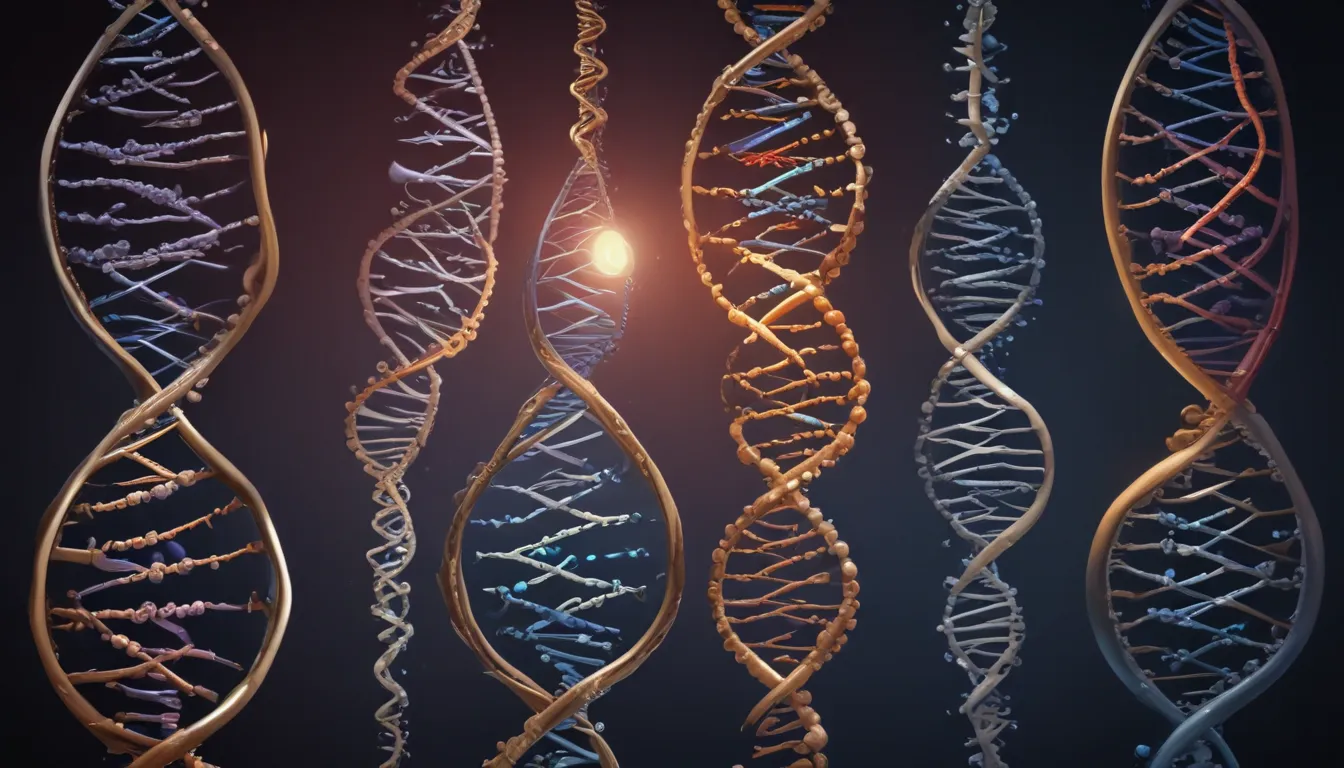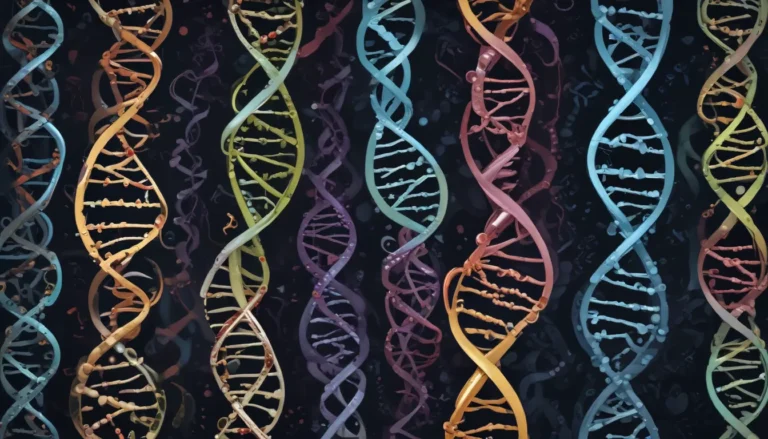A Note About Images: The images used in our articles are for illustration purposes only and may not exactly match the content. They are meant to engage readers, but the text should be relied upon for accurate information.
Genetics, the study of inheritance and variation of traits in living organisms, has been a cornerstone of scientific exploration since Gregor Mendel’s pioneering experiments with pea plants in the 19th century. Delving into the structure and function of genes, genetics has broadened its scope to encompass their role in evolution, human health, and even criminal investigations.
Unveiling the Intricacies of Genetic Material
Genetic material, also known as DNA, resides within every cell of the human body. This DNA serves as the blueprint that determines various physical traits, behaviors, and even drug responses. With each cell containing this genetic material, our understanding of genetics opens up a world of fascinating discoveries that shed light on the complex fabric of life.
Connecting Through Shared DNA
Despite our perceptions of uniqueness, humans share an astonishing 99.9% of their DNA with one another. This shared genetic code underscores our interconnectedness as a species and highlights the fundamental similarities that bind us together.
Genetic Insights From Various Sources
Advances in genetic research have enabled the extraction of DNA from diverse sources such as hair, nails, saliva, and even ancient remains. This genetic material serves as a valuable resource for unraveling ancestral histories and identifying genetic predispositions.
Unraveling the Role of Genes in Shaping Traits
Genes, segments of DNA, hold the instructions for constructing and maintaining our bodies, influencing physical appearances and susceptibility to diseases. Understanding the impact of genes on our traits provides insight into the intricate mechanisms governing human development.
The Genetic Bond of Identical Twins
Identical twins share a unique genetic bond, stemming from the splitting of a single fertilized egg into two embryos. This identical DNA serves as a powerful tool for studying the interplay between nature and nurture in human development.
Navigating Genetic Disorders
While genes can bestow beneficial traits, some carry mutations that lead to genetic disorders. These disorders, inherited from parents, underscore the importance of genetic testing and early intervention to manage potential health risks.
Empowering Through Genetic Testing
Genetic testing represents a transformative milestone in medical advancements, offering individuals the opportunity to uncover genetic predispositions to diseases. Armed with this knowledge, individuals can make informed decisions regarding their health and well-being.
Impact of Genetics on Longevity
Genetics exerts a significant influence on lifespan, with certain genetic variants influencing factors such as aging, disease susceptibility, and overall health and longevity. By unraveling the genetic determinants of lifespan, researchers continue to pave the way for enhanced insights into human health.
The Vital Role of Genetic Diversity
Genetic diversity, integral to species survival and adaptation, ensures resilience in the face of environmental challenges. Embracing genetic diversity enhances species’ capacity to combat diseases, environmental changes, and other adversities.
Harnessing Genetic Modification for Progress
Genetic modification, a powerful tool in genetic engineering, enables scientists to manipulate the DNA of organisms, including crops. Through targeted genetic alterations, crop yield, disease resistance, and nutritional content can be improved to address global food security challenges.
Insight Into Behaviour and Personality Traits
Our genes not only dictate physical traits but also play a role in shaping behaviors and personality characteristics. Genetic influences on traits such as intelligence, empathy, and risk-taking behavior underscore the nuanced interplay between genetic and environmental factors.
Personalized Medicine Through Pharmacogenomics
Genetic variations influence individual responses to medications, laying the foundation for personalized medicine through pharmacogenomics. By identifying genetic markers that predict drug responses, healthcare professionals can tailor treatments to optimize patient outcomes.
Embracing the Dynamics of Gene Expression
Genes can be regulated through the process of gene expression, with external factors modulating whether genes are activated or silenced. This intricate interplay between genes and environmental cues shapes how genetic information is processed and interacts with external stimuli.
Preserving Genetic Diversity in Conservation Efforts
Conservation biologists advocate for maintaining genetic diversity in endangered species to enhance their capacity to adapt to changing environments. Understanding the genetic composition of species is essential for formulating effective conservation strategies to safeguard biodiversity.
Evolutionary Impacts of Genetic Mutations
Genetic mutations, alterations in DNA sequences, serve as catalysts for evolutionary change by introducing new traits into populations. These mutations drive the emergence of novel species through the selection of advantageous characteristics that promote survival and reproduction.
Embracing the Genetics Revolution in Medicine
Genetic research has revolutionized medicine through groundbreaking advancements, from elucidating DNA’s structure to developing gene therapies and precision medicine. The insights gleaned from genetics continue to redefine disease understanding and treatment modalities.
Shedding Light on Mental Health Through Genetics
Genetics exert a substantial influence on mental health conditions, such as depression, anxiety, and schizophrenia. Genetic variations predispose individuals to mental disorders, emphasizing the need for improved diagnostic and treatment approaches rooted in genetic insights.
Conclusion: Embracing the Wonders of Genetics
In conclusion, genetics unveils a captivating realm of discovery, offering insights into inheritance, evolution, and human health. From unraveling the secrets of DNA to deciphering the complexities of gene expression, genetics unlocks a world of possibilities. As technology advances, the exploration of genetic intricacies holds promise for personalized medicine, gene therapy, and enhanced healthcare outcomes.
FAQs: Navigating Genetic Inquiries
-
What is genetics?
Genetics is the study of heredity and the mechanisms by which traits are passed down from parents to offspring through genes, DNA, and genetic expression. -
How does genetics influence health?
Genetics plays a pivotal role in determining susceptibility to diseases, inherited disorders, and common health conditions, shaping individual health outcomes. -
Can genetics be influenced by the environment?
Environmental factors can interact with genetics to modify gene expression, influencing how traits are manifested and impacting health and development. -
How has genetics revolutionized medicine?
Genetics has transformed medicine by uncovering disease origins, enabling targeted treatments, and fostering personalized medicine tailored to individual genetic profiles. -
What does the future hold for genetics research?
The future of genetics research holds vast potential, with technologies like CRISPR gene editing offering new avenues for treating genetic disorders and enhancing biological understanding.
Genetics continues to captivate with its mysteries and wonders, inviting ongoing exploration and discovery. From the intricate world of genetic drift to the revealing insights of genetic epidemiology, the realm of genetics beckons with endless fascination and promise. Venture further into this captivating field to deepen your understanding of the genetic tapestry that shapes life on Earth.






